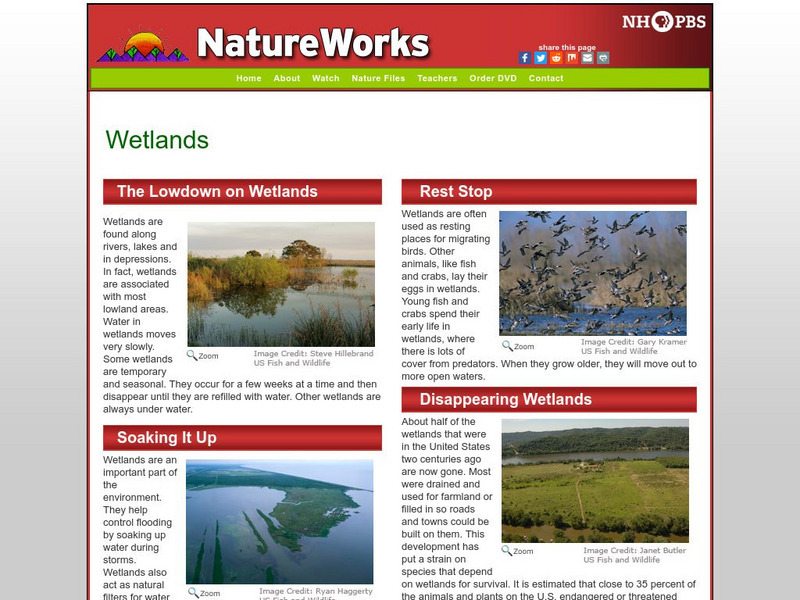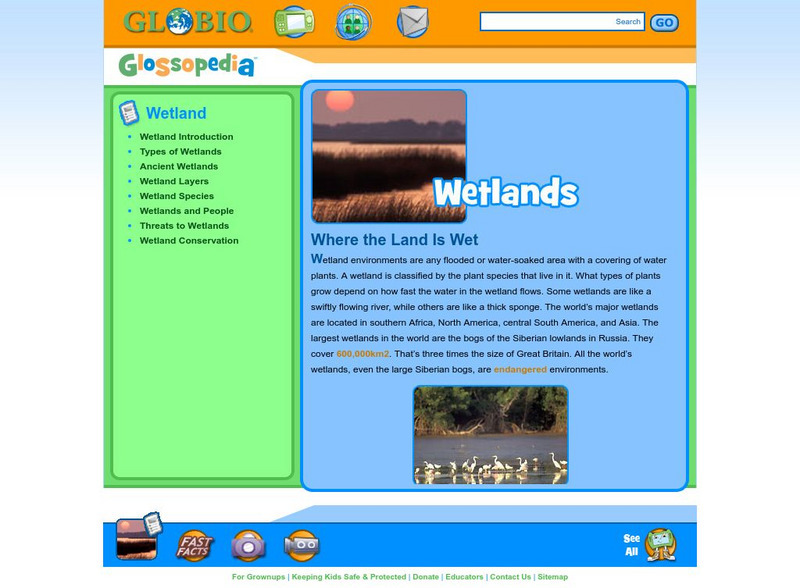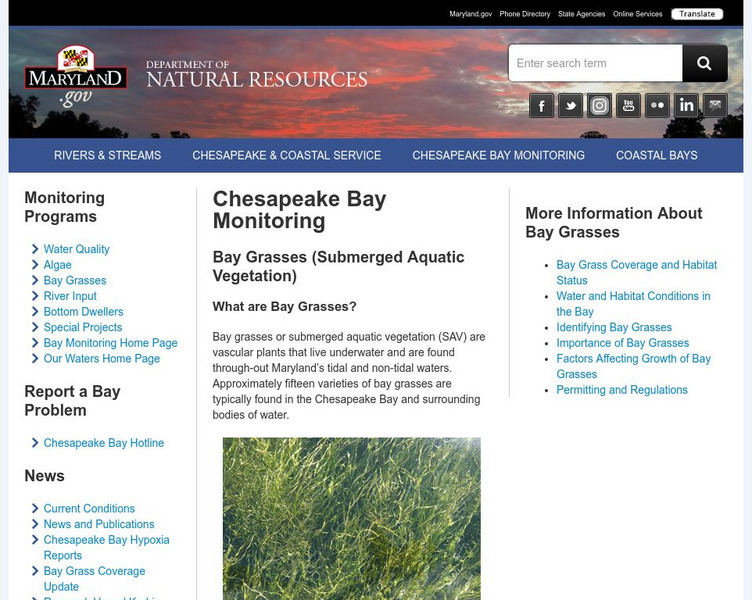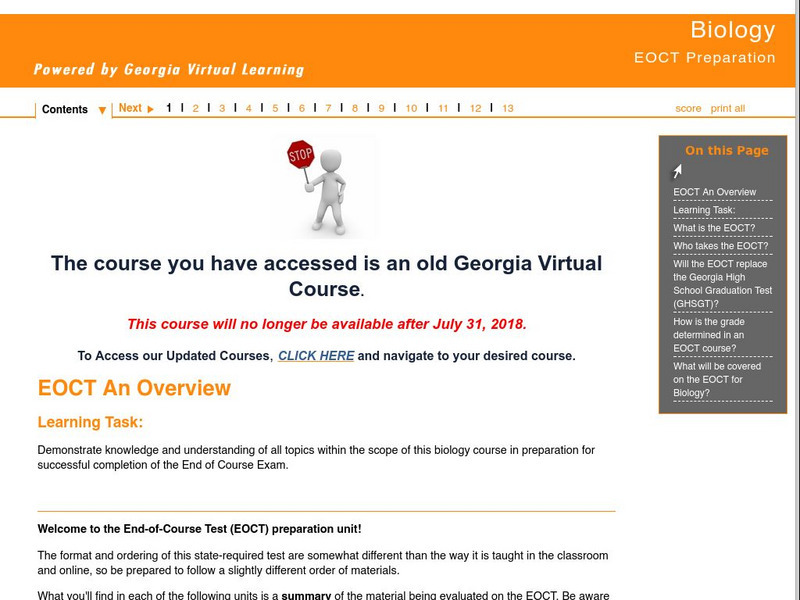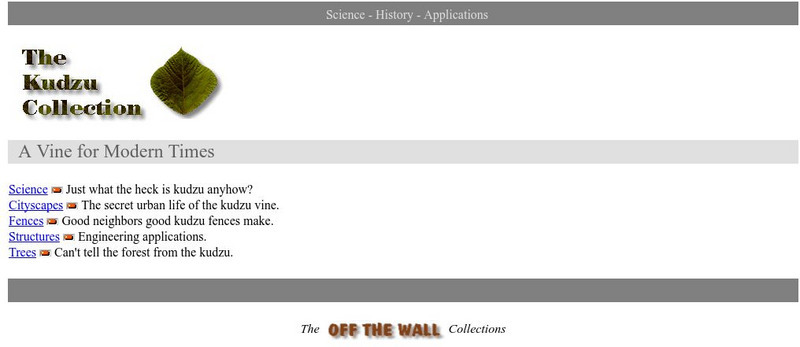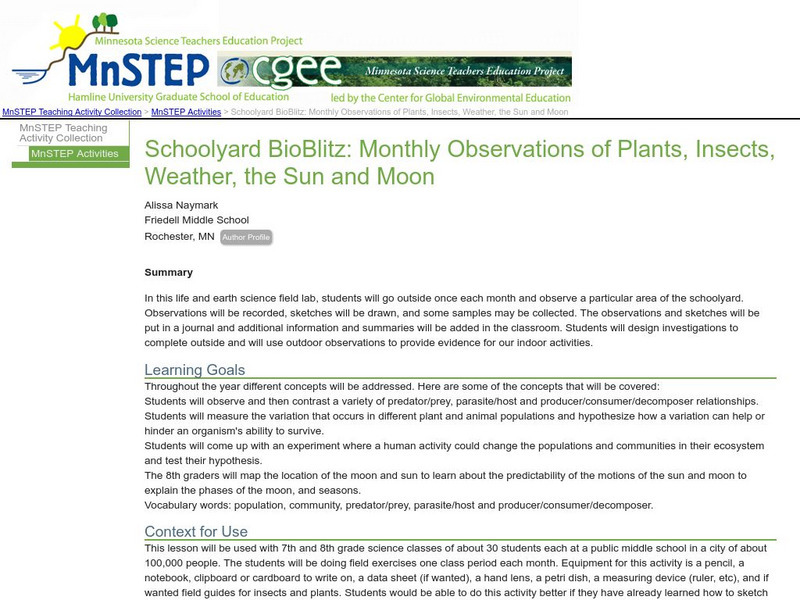Hi, what do you want to do?
US Environmental Protection Agency
Epa: Wetlands and Nature
This concise site discusses the fact that wetlands are among the most productive ecosystems in the world, play an integral part in the ecology of the watershed, and also have a role in atmospheric maintenance.
BioEd Online
Bio Ed Online: Needs of Living Things: Pre Assessment
This is a pre-assessment to be done at the beginning of a unit on the needs of living things. Students draw themselves and what they need to survive. The lesson can be downloaded in PDF format.
PBS
Nh Pbs: Nature Works: Temperate Deciduous Forests
NatureWorks offers some fascinating information about the Temperate Deciduous Forests. Students and teachers will learn what makes these forests special, what animals live in this biome, what plants grow in this biome, and more.
Science Education Resource Center at Carleton College
Serc: Courtyard Observations One Small Step
Students observe a one square foot area to make detailed observations of plants, animals, and insects outdoors in the school courtyard.
PBS
Nh Pbs: Nature Works: Wetlands
Did you know that wetlands are frequently used as resting stops for migrating birds? This is just one of the many interesting facts found within this educational resource. This site features information on the characteristics, types,...
Nature Conservancy
Nature Conservancy: Planet Earth: Oceans and Coasts
Compilation of the Nature Conservancy's content about the ecology of oceans and coasts. Emphasis is on the biodiversity of these habitats and the human impact on the animal and plant life that live in our oceans and on our coasts.
PBS
Nova: Stories in Amber
Like a time machine, amber fossils take us back in the earth's history to discover the plants, animals and ecological relationships of prehistoric ecosystems. This resource has several interesting pictures of a variety of Dominican...
Globio
Glossopedia: Wetland
Wetlands are an integral piece of Earth's ecology. Wetland structure is described as well as their role in the health of plants and animals. Issues concerning destruction and preservation efforts also discussed.
Environmental Education for Kids
Eek!: Habitats
Take a look at some of the different habitats that are home to many plants and animals including black bears, owls and various species of birds.
Other
Maryland Dnr: Chesapeake Bay Monitoring: Bay Grasses
This resource provides information about the marine grasses found in the Chesapeake Bay. Click on adjacent links to learn about their habitat, how to identify them, and why they are important.
Other
Missouri Conservationist Online: Missouri Cave Life
Excellent article describing a trip inside a cave. The article discusses the cave habitat and changes that occur as you go deeper into the cave. Includes interesting photographs.
University of Florida
South Florida Aquatic Environments: Florida Keys: About the Keys
The Florida Museum of Natural History offers an excellent review of the reefs, mangrove and seagrass habitats of the Florida Keys. Spend some time learning about this unique location.
University of Guelph
Introduction to Invertebrate Biodiversity: Fungi
Find out more about fungi when you check out this comprehensive site. This resource provides an introduction and information on morphology, reproduction and the importance of fungi. Don't miss out on this fascinating source.
Georgia Department of Education
Ga Virtual Learning: Biology: Eoct Preparation
Students participate in this comprehensive review to demonstrate knowledge and understanding of all topics within the scope of this biology course in preparation for successful completion of the Georgia End of Course Exam. It can also be...
Other
Earth's Birthday Project: Educating About the Earth
This site is loaded with science activities for elementary students. There are role plays, recipes, dances, writing exercises and craft ideas. You can also raise you own luna moths, praying mantids, ladybugs or carnivorous plants. Lots...
Other
Galapagos Islands: Wildlife Gallery
Great photos and descriptions of the wildlife in the Galapagos Islands. There are also links to information on the natural history, environment, and geology of these islands.
Discovery Education
Discovery Education: Lesson Plans Library K 5
This resource presents a lesson plan library which holds hundreds of lesson plans organized by grade level and subject area. Often rooted with an Internet research piece, each lesson plan contains specific objectives, procedures,...
PBS
Pbs Learning Media: Nature Cat: Story Exploration Packet
As you watch Nature Cat, use these tools to guide discussions and learning activities. Includes printables on story elements, alternate endings, vocabulary words, character traits, an episode map, and a Venn diagram.
ibiblio
Ibiblio: The Kudzu Collection (Photographs)
A fascinating Ibiblio.org collection of Kudzu photos in a variety of southern habitats. There is a short report on the history and botany of this vine.
Smithsonian Institution
Smithsonian Environmental Research Center: It's All in the Watershed
Learn about your ecological home on this site. The nation shares the Chesapeake Bay watershed, our ecological home. Most stories on this site focus on separate plants and animals, but together, these stories literally show a web of life.
Environmental Education for Kids
Eek!: Evergreens
Site chronicles Wisconsin's Evergreen and Conifer trees. There are descriptions of the various tree types. Additionally, site details the uses of these trees in nature. Ideal for grades 4-8.
University of Florida
Florida Museum: South Florida Aquatic Environments: Introduced Species
The transport of living plants and animals to areas beyond their native range has been practiced by human beings for thousands of years. While some introductions are intentional, others occur by accident or happenstance. Regardless of...
Other
Tijuana Estuary Visitor Center
This site from the Tijuana Estuary Visitor Center has information on the visitor center and the Tijuana Estuary.
Science Education Resource Center at Carleton College
Serc: Mn Step: Schoolyard Bio Blitz
For this activity, students visit a small section of the schoolyard and record observations in a scientific journal. They will observe different things as the school year progresses, including ecological relationships, human impact on...









